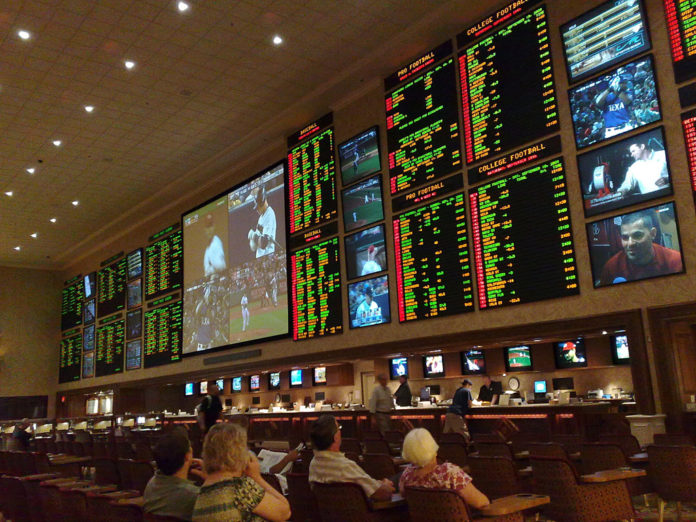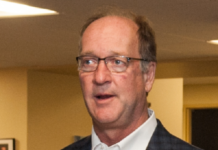Leading Kansas legislators say they’re ready to start planning for legalized sports wagering after the U.S. Supreme Court struck down a federal law prohibiting many states from allowing sports betting.
Senate President Susan Wagle said Monday she thinks the Legislature would move to “appropriately” regulate sports wagering, while House Majority Leader Don Hineman said lawmakers should move quickly to put a bill together that might be able to pass next session.

“Today’s Supreme Court decision is a victory for states’ rights,” Wagle said in a statement.
“The legalization of sports betting will help diminish illegal gambling operations and allow states to bring their regulations into the 21st century,” she said. “I am confident the Kansas Legislature will act appropriately to regulate sports betting next year.”
Hineman said it’s important for the Legislature to start developing a bill that different special interests — professional sports leagues and the state’s casinos, for example — can agree on so the state doesn’t get left behind the many other states that will likely permit sports gambling following the landmark ruling.
“Early adopters will have more of an opportunity to attract a customer base,” Hineman said. “I think there’s some urgency to putting something together as quickly as we can to sort out how it ought to operate.”
Some estimates indicate that legalizing sports betting could net the state somewhere between $6 million and $27 million a year in local and state taxes, depending on how high it’s taxed and how widely available sports betting is permitted.
Five states — Mississippi, Connecticut, Pennsylvania, New Jersey and West Virginia — have already passed legislation authorizing sports wagering in anticipation of Monday’s Supreme Court decision. They are considered to be among the places where sports betting will be allowed by the time the NFL season starts this fall. Bills were introduced in 14 other states, including Kansas and Missouri.
Last session, there were four bills introduced in the Kansas House that authorized sports betting. Another bill was introduced in the Senate. The legislation never went anywhere, although there was an effort to attach a sports wagering bill to a slots bill in the Senate. The amendment died on a 23-12 vote.
With some uncertainty about what the Supreme Court might do, lawmakers weren’t in a hurry to push any legislation through this year, Hineman said.
“Not a lot of people were really excited about it because they didn’t know it was going to happen,” Hineman said. “Now that we know it can happen, people will be engaged.”
Sports wagering — as straightforward of an issue as it may seem — brings with it many complexities that lawmakers will need to work through before it can be enacted. Consider:
- How much of a cut should major league sports get from legalized sports betting? One bill would have given the sports leagues a 1 percent take from the money gambled on sports in Kansas. Another would have earmarked 0.25 percent for the sports leagues. A third didn’t include any fee. The so-called integrity fee is a hot issue in Kansas and elsewhere. Casinos oppose it, saying it will cut into an already thin profit margin for sports books. Some lawmakers are skeptical about how the tax would be used.
- To what extent should sports wagering be allowed on internet sites and mobile apps? There’s a fear that mobile sports wagering wouldn’t be well regulated. Casinos also have a problem with this idea, saying interactive sports gambling should be conducted on interactive platforms run by brick-and-mortar casinos.
- How involved should the Kansas Lottery be in sports wagering? A couple bills in the Legislature this year called for the lottery to oversee sports wagering. One bill would have allowed the lottery to offer sports betting at any facility it operates and through any lottery retailer — such as a gas station — that contracts to offer sports betting.
- Should sports betting be limited to state casinos and pari-mutuel tracks if they reopen, or should it be available at various lottery retailers across the state?
Penn National Gaming, owner of the Hollywood Casino in Wyandotte County, issued a statement Monday praising the Supreme Court’s decision.
While Hollywood raised concerns about a couple of the bills last session, it wants to work with lawmakers to craft a bill that best serves the casino while generating revenue for the state.
“As we said during the legislative session, sports betting could be another amenity at Hollywood Casino at Kansas Speedway and help generate additional visitation to the property, as well as drive incremental tax revenue for Kansas,” said Jeff Morris, vice president of Penn National Gaming.
“We welcome the opportunity to continue the discussion of legal sports betting with legislators in Topeka and other key stakeholders,” Morris said.
Kansas Gov. Jeff Colyer praised the court’s decision as a win for states’ rights.
“I look forward to working with legislators and all parties involved to come to a resolution that will work for Kansans,” he said in a statement issued Monday.
Republican state Rep. John Barker, chairman of the legislative committee that oversees gambling issues, said he wants the issue studied before the next session. Like Hineman, Barker wants to develop some kind of consensus on a bill that could be considered next year.

“It’s just kind of working it out with the leagues,” Barker said.
Republican state Sen. Bud Estes, chairman of the Federal and State Affairs Committee, believes the sports wagering issues will demand the Legislature’s attention next year.
“I’m sure it will move forward,” Estes said. “I’m sure as soon as we hit Topeka next January, that will be one of the first things that pops up.”
Republican Sen. Rob Olson of Olathe is vice chairman of the Federal and State Affairs Committee. He pushed the sports wagering amendment this year.
He predicts the Legislature will pass something next session and it may include an effort to permit slots at select locations, such as the Wichita Greyhound Park in Sedgwick County and The Woodlands in Wyandotte County.
“I do believe it will pass next year now that the court has ruled,” Olson said. “There’s $1 billion worth of sports betting going on in Kansas that we’re not getting any revenue from. There’s too many other states that are going to do it, and we have to do it or we’re losing it out.”
















